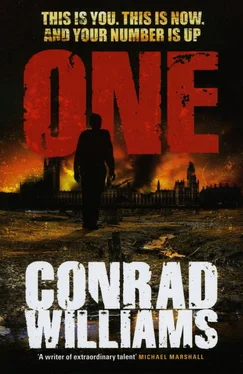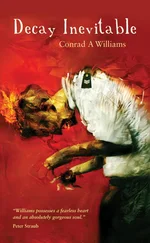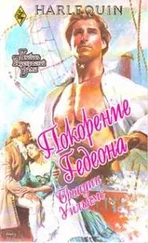At the South Bank he got down off the bridge and followed the obstacle course of the Queen’s Walk as far as Bermondsey and it was just him and his bad leg and the same old sound of his breath rasping inside the bicycle mask. As he passed beneath Tower Bridge he thought he heard laughter and song. But he also heard gunfire and screaming, further south. The laughter and song died pretty quickly after that.
He stood on the pier and looked out at the lapping river. Rat Island rose out of it like a swollen belly from cold bathwater. He saw people moving over the great built-up mound of wreckage, looking for food, or for relatives. Bivouacs dotted this artificial island; people emerged from tunnels like maggots from bad apples.
Jane called out: ‘Hey!’
Faces turned to the river bank. Most went back to their rooting; one man cupped his mouth and asked for a name.
‘Richard Jane. I have news.’
The man untied a simple boat from a post and rowed his way over to where Jane stood. He was short and bald, his head strangely large on top of his wasted body, like an unsucked lollipop. He introduced himself as Jon Petersen, a printer from Bergen, Norway who had moved to London to live with his English wife who owned a luggage shop in Nunhead. His wife had disappeared during the Event while Petersen had been in the centre of town, travelling on the Tube, shopping for her birthday presents.
‘How many are you?’ Jane asked.
Petersen looked back at the island. ‘There are a few hundred here,’ he said. ‘It’s a hellish stink, but we feel safe. Skinners don’t go swimming. And the rats we can cope with. They make good eating, if you can catch them. You have to fast them first, though, for a few days or they’re bitter.’
Jane saw the rats moving briskly across the skin of the island, surefooted and sleek, as if they were on rails. They did not seem as fat or aggressive as they used to be. Everything that had survived was losing weight. He was coming to see the raft as a last chance.
He told Petersen what he knew and the other man listened without speaking, constantly licking his already wet lips so that Jane could not take his eyes from them; they resembled the flesh of cherries.
‘A raft,’ Petersen said, when Jane was finished. ‘In the water?’
Jane nodded. ‘There are people on the way now.’
‘I saw them. I wondered what was happening.’
‘Head for the south-east,’ Jane said. ‘Tell your people.’
‘The water,’ Petersen said again. He seemed troubled as he pushed the boat off for the island. He kept looking into the river around him, as if it contained things that he found suddenly unpalatable.
Jane felt liberated. He had done what had been asked of him. Everyone in London who hadn’t struck out on their own had been made aware of the existence of the raft. The city was emptying. Now he hoped that the screams and howls he could hear belonged to the Skinners as the streets turned lonely and the houses grew used to the ageing echoes of human voices.
He watched Petersen tie the boat off at the platform. A crowd quickly grew around the Norwegian. Jane waved once to them, turned his back, and headed for the Old Kent Road.
* * *
After about an hour he heard little footsteps slapping through the wet, struggling to keep up.
‘Hello, Stanley.’
‘Hiya, Dad.’
‘Where’ve you been?’ He was tempted to look to his side, but he didn’t want the illusion to vanish just yet. It was enough to see the blue stripe of Stanley’s pyjamas in his peripheral vision, the arc of his arm as he swung Walter up and down. He had walked the length of the A2; New Cross Gate was ahead, then Lewisham and the A20 that would take him into Kent. The crippled expanse of superstores lay around them like so many crushed sardine cans.
‘You sticking to the road, Dad?’
‘Yeah, why? I’ll probably catch up with more people before long. It’ll be safer then.’
‘Safer? How?’
He wanted to reach out and plant his hand on the boy’s hair, feel the heat of his scalp run through his fingers. Drop his hand to Stanley’s slender neck, feel the muscles shift against each other under the impossible soft skin.
‘You’ve heard of safety in numbers haven’t you?’
‘No.’
‘Well. It means the more of you there are, the less afraid you need to be.’
‘I think that’s a load of rubbish.’
Jane stopped. He checked behind him, but there were no refugees. The road was empty. It had been preying on his thoughts; he believed that by now he would either have caught up with a convoy, or been assimilated by one joining the A2 at any of the main junctions.
He no longer wanted to look down at Stanley, but not because he was concerned the boy would fragment and drift apart, like desert cloud. He was scared. Stanley’s eyes, what he could make out from the corner of his own, were too large for his head, too dark. His voice had faltered, but it was not the change in vocal cords you would expect from a boy who was in his fifteenth year. It was slurred, scorched, splintered. It had been interfered with in some way. Now he suspected that the way Stanley kinked his neck to look up to his father was no longer some endearing facet of his behaviour but an enforced failing in his physicality, a terrible injury.
‘Are you all right, Stanley?’
‘Fine,’ came the voice. It was no longer that of his son. It was filled with fluid. The boy’s face vibrated; he could hear the chomp and smack of his own lips as he chewed through the flesh of his cheeks and mouth. Shadows descended. Jane thought it might be unconsciousness but it was a dozen or so birds – vicious grey shrikes – fluttering down to tear strips from his boy’s face. He scattered them with his fists and turned to sweep Stanley into his arms.
There was little left of him. He was an effigy, a voodoo-doll death threat. Spurs of bone shone through where the hard beaks had drilled him. Jane could see through the plundered sockets of his eyes to a part of his son that had once flickered with happy memories of chases in the park and cuddles on a sofa watching cartoons. The boy turned to nothing under his fingers. He was sure he could hear the creak and caw of airborne birds but when he looked above him there was only the iron-plaited insult of the sky.
He turned his attention back to the road ahead. What had Fielding said that day? Something about a cordon? A slip-knot tightening. The wind gusted into him like the over-affectionate shoulder charge of a drunken friend. Danger was in it. He was sure he heard cries and shouts from up ahead, although he’d hoped he might have left that behind. Screams in the daytime. ‘Get off the road, Dad,’ Stanley said. His voice. His good voice. Jane heeded the advice. He got onto the railway line at New Cross and followed the track along the backs of schools and works and supermarkets. The embankments wore a second skin of fly-tipped rubbish, machinery and cadavers eroded by the weather almost to nothing. He hurried beneath those bridges that still stood, aware of their weakness, or manoeuvred a route through those that had crashed to the rails, sometimes topped by cars bearing occupants who bore the same gritted expression he’d seen everywhere for the past ten years. The look of death was the look of someone concentrating, or grimacing in pain or embarrassment, or concealing a hilarious secret.
The track wound through Lewisham, bypassing depots and shuttling under the high street. He hurried by ruptured, stinking stock at the Hither Green sidings without bothering to look at what was inside. No food here. No hope of help. Human bones had sifted to the surface of the embankment outside the cemetery, sprawling over the rails as if left there by some untidy scavenger. The land opened up. The arid span of a former golf course. The spent matchsticks of a wood.
Читать дальше












